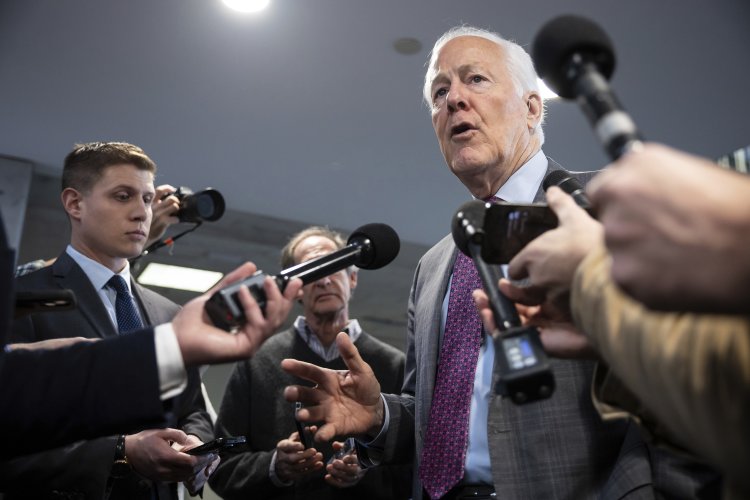Primary Challenges Like Paxton's Are Just the Beginning for Senate Republicans
The Texas primary presents a challenge to the long-serving incumbent senator.

Top GOP senators were already working to undermine the Texas attorney general prior to his announcement of a primary campaign this week against four-term Sen. John Cornyn. Some urged President Donald Trump to endorse Cornyn, the incumbent leadership adviser and former chair of the Senate campaign arm, who has a robust donor network.
“The best thing would have been to keep Paxton out of the race,” said Sen. Kevin Cramer, a close Trump ally. He added that at this point he would advise Trump to do “whatever is most helpful for John.”
Interestingly, Sen. Ted Cruz has opted to remain neutral in the race between Cornyn and Paxton, and two members of the Texas delegation have already chosen to support Paxton.
Paxton represents just the beginning of the party's primary challenges. Republicans are anxious that Trump may elevate more MAGA-aligned candidates against incumbents in multiple states, leading to contentious primaries. Senate Republican leaders are particularly focused on preventing a Trump-endorsed primary challenge to Sen. Thom Tillis in North Carolina, which is one of the most competitive races next November. Similarly, Sen. Bill Cassidy in Louisiana, who voted to convict Trump in light of the Capitol riot in 2021, is facing challenges from the right.
Republicans hope Trump will assist them in avoiding intraparty disruptions that could complicate their Senate map in the upcoming election cycle. However, they are acutely aware that a single comment from the president could derail their plans.
Sen. Tim Scott, chair of the National Republican Senatorial Committee, has expressed that he is collaborating with Trump to ensure they are aligned on protecting incumbents. After Paxton entered what is expected to be a highly expensive primary battle, Scott reiterated his support for Cornyn, calling him "a leader who delivers on President Trump's agenda” and an “essential part of the Republican Senate Majority.”
However, the behind-the-scenes efforts by GOP leaders to convince Trump to back Cornyn highlight an ongoing reality for Republicans: their reliance on Trump even as they recognize they cannot control him.
The Senate map appears to be largely favorable for Republicans in 2026, but the party is keen to avoid the typical issue of seeing untested candidates advance through primaries only to burden the party in the general election or necessitate spending on what should be secure seats. During the 2022 midterms, Trump endorsed candidates such as Mehmet Oz, Blake Masters, and Herschel Walker, all of whom lost their competitive general elections.
Sen. Steve Daines, last cycle’s NRSC chair, worked diligently to navigate this challenge by closely cooperating with Trump to select candidates with stronger prospects in the general election, helping to secure the Senate majority for Republicans. Yet, as Republicans face new challenges in 2026, they find themselves on the defensive, particularly with incumbents confronting additional challenges from the right.
“Look, you always have to take primaries seriously, always,” Daines said. “What we tried to do at the NRSC last time is try to minimize that. But you’re always concerned about colleagues in a primary.”
According to Daines, Trump is maintaining “a close eye” on Senate races.
Senate Republicans aren’t the only ones attempting to engage Trump for support in primaries; in some cases, these efforts are inadvertently backfiring. Paxton entered the race sooner than planned after discovering that Senate Majority Leader John Thune was pursuing Trump’s endorsement for Cornyn, as revealed by a person close to Paxton who spoke under the condition of anonymity. Additionally, Paxton has allies advocating for Trump’s endorsement.
Cornyn aligned himself with Trump during the initial months of his second term and emphasized his collaboration with Trump during his unsuccessful bid for majority leader last year. Nevertheless, Paxton has signaled he will accuse Cornyn of lacking loyalty to Trump during his campaign.
Aides to Trump and the Republican National Committee did not immediately respond to requests for comment.
In North Carolina, Tillis has already encountered primary challengers and may face another candidate, Michele Morrow, who has previously run unsuccessfully for the state's superintendent of public education. There has also been talk of Lara Trump, the president’s daughter-in-law, potentially running, although she recently signed on with Fox News Channel.
Tillis, when asked if he had discussed an endorsement with Trump’s team, remarked, “it’s too early for me to get into those sort of discussions.”
However, uncertainty surrounds Cassidy's ability to regain Trump’s favor. Louisiana State Treasurer John Fleming has announced his candidacy against Cassidy, with more Republican challengers likely to emerge. Despite Cassidy's alignment with Trump on significant GOP initiatives this year, including supporting a pivotal vote for Robert F. Kennedy Jr.’s nomination, some Senate Republicans doubt this will suffice to win Trump’s endorsement.
Cramer expressed uncertainty about Trump being able to support Cassidy, stating, “I don’t know — impeachment, that’s a tough one.”
Another Trump ally, who spoke on the condition of anonymity, suggested there was “no way” the president would remain neutral, much less endorse Cassidy, in the primary. Additionally, Sen. John Kennedy, typically known for his sociability, declined to comment on whether he is or plans to discuss Trump’s endorsement in Cassidy’s race.
Cassidy was hesitant to address the possibility of facing a Trump-backed opponent on Wednesday, dismissing the question as “kind of a silly question.” He also inquired, "Where is this coming from?" when asked about conversations with Trump regarding endorsements.
A notable distinction between Cassidy and other vulnerable incumbents is that his seat in Louisiana isn’t seen as a potential general election target, meaning the party's chances aren’t contingent on Cassidy winning his primary.
Cassidy is encountering a new challenge in maintaining his seat: Louisiana has eliminated its unique primary system for congressional races that previously advanced the top two vote-getters to a general election, regardless of party affiliation. This change means Cassidy must appeal to a more conservative, Trump-aligned electorate to secure his place in the general election.
If Trump decides to target Cassidy, it could spark a public rift between Trump, Thune, and the Senate GOP campaign apparatus that supports incumbent senators. Moreover, any financial resources drained from Republicans during the primary would detract from funding available for competitive races in the general election.
When asked if he engaged in similar discussions with Trump regarding Cassidy as others have with Cornyn, Thune indicated in a brief interview that Republicans are taking each race “one at a time.”
“Obviously we’re invested in helping our incumbents,” Thune said, noting he is collaborating with the White House and the Senate GOP campaign arm to ensure “we’re in the best possible shape going into the midterm elections with both our candidates — incumbents, but also some challengers.”
Emily Johnson for TROIB News












